4 September 2018 – 2 December 2018
Beginning with the Seventies: Collective Acts
-
Dana Claxton
ArtistDana Claxton (Lakota, Canadian, b.1959) is a multidisciplinary artist born in Yorkton, Saskatchewan and based in Vancouver. Drawing on Lakota cultural values, history and language, Claxton questions the multifaceted layers of identity inherent to indigenous ways of being. Issues surrounding indigenous labour and resistance, resource extraction and capital feature prominently in her latest research and work on the Service, Office and Retail Worker’s Union of Canada’s (SORWUC’s) 1978 protest action against the Muckamuck Restaurant.
Claxton’s work has been shown internationally at the Museum of Modern Art (NYC), Walker Art Centre, Sundance Film Festival, Eiteljorg Museum, and the Museum of Contemporary Art (Sydney), and held in several major Canadian public collections. Her awards include the VIVA Award and the Eiteljorg Fellowship. Her work was selected for the Sydney Biennial (2010), Biennale de Montréal (2007), Biennale d’art contemporain du Havre, France (2006), Micro Wave, Hong Kong (2005) Art Star Biennale, Ottawa (2005), and Wro 03 Media Arts Biennale Wroclaw Poland (2003).
Read More
-
Christine D'Onofrio
ArtistChristine D’Onofrio (Canadian, b. 1978) is a visual artist based in Vancouver who works in photography, video, digital media, interactive media, printmaking, sculpture, book works and installation. Her work employs a critical lens to address feminist strategies, influences and discourses pertaining to structures of exploitation, humiliation and power. Exploring the contradictions and ambiguities of liberty, especially under capitalism, her work frequently juxtaposes consumer culture and mass media with art historical references.
D’Onofrio holds a BFA from York University, Toronto and an MFA from the University of British Columbia. She has shown extensively throughout Canada in solo and group exhibitions and has received several Canada Council for the Arts Visual Arts and Research/Creation grants. She currently teaches at UBC in the Department of Art History, Visual Art and Theory and is the recipient of several teaching awards and grants including the Killam Teaching Prize in 2018 and the Teaching Learning Enhancement Fund in 2015-17 and 2018-20.
Read More
-
Jeneen Frei Njootli
ArtistJeneen Frei Njootli (Vuntut Gwitchin, b.1988) is an artist whose practice is concerned with Indigeneity-in-politics, community engagement and productive disruption. Her interdisciplinary approach uses performance, photography, sound and textiles to deconstruct the history of materials and investigate their relationship to trade, ceremonial regalia and the politics of Indigenous representation. Frei Njooti is a founding member of the ReMatriate Collective.
Frei Njootli completed her MFA at University of British Columbia in 2017. Her recent solo exhibitions have been shown by Contemporary Art Gallery, Vancouver (2018), Artspace, Peterborough, ON (2018), Southern Alberta Art Gallery, Lethbridge (2017), and Definitely Superior Art Gallery, Thunderbay ON (2017). In 2018 she was shortlisted for the Sobey Art Award. She is the recipient of the Contemporary Art Society Vancouver Artist Prize (2017) and the William and Meredith Saunderson Prize for Emerging Artists (2016).
Read More
-
Heather Kai Smith
ArtistHeather Kai Smith (Canadian, b. 1988) is an artist from Calgary, Alberta, currently living and working in Vancouver. Rooted in drawing as a practice, her work includes animation, illustration, and printmaking. Recent bodies of work engage with legacies of feminist protests, such as the Seneca Women’s Peace Encampment (1983-94). Through hand drawing and installation, Smith seeks to activate historical, archival images as a way to rearticulate revolutionary desires and activism in a contemporary context.
Smith completed her MFA at the Emily Carr University of Art and Design in 2017, and graduated with a BFA in Drawing from the Alberta College of Art and Design in 2009, Calgary, AB. Her work has been shown at Access Gallery (Vancouver), Contemporary Calgary, Jarvis Hall Fine Art, TRUCK Contemporary Art (Calgary), and DNA Artspace (London, ON). Smith is the founder of Great Women Animators, an online database aimed at educating, disseminating and championing the work of an international group of women animators from the last century.
Read More
-
Salish Weavers Guild
Artist CollectiveAdeline Lorenzetto, Shxw’ōwhámél
Mary Peters, Seabird Island
Annabel Stewart, SkwahThe Salish Weavers Guild was a group of mostly women from First Nations communities in the Fraser Valley – those known as the Stó:lō, or people of the river – who joined in relearning the ways of their ancestors, experimenting with fibre-processing, natural dyes and patterns. In 1971, the group formally incorporated as a cooperative association with the express purpose to revitalize the ancient practice of Salish wool weaving. In June 1972, their shop and headquarters opened on the grounds of the former Coqualeetza Institute, a residential school (1886–1940) and Indian Hospital (1941–1969) since reclaimed by the local First Nations (1969–present). Over sixty women, and some men, were once involved in the Guild in varying capacities.
The women of the Guild were creating more than weavings; they were generating agency in a period of expansive cultural and economic revival, while strengthening relationships across Indigenous and non-Indigenous communities. While the Guild’s collective activities and sales wound down by the mid-1980s, Salish weaving continues to flourish, connecting people throughout Salish territories.
Read More
-
The ReMatriate Collective
Artist CollectiveKelly Edzerza-Bapty (Tahltan, Canadian, b. 1982)
Jeneen Frei-Njootli (Vuntut Gwitchin, b.1988)
Tsēmā Igharas (Tahltan, Canadian, b. 1984)
Denver Lynxleg (Tootinaowaziibeeng, Canadian, b. 1986)First initiated in 2014 as an online discussion in response to the gross misrepresentation of Indigenous womxn in the media, the ReMatriate Collective formed in 2015. ReMatriate’s name is a play on the term repatriation, which describes the return of cultural belongings to their rightful communities. An important process of decolonization, the etymology of the word repatriation reflects non-Indigenous concepts and relationships to belongings, place, land and ownership. ReMatriate challenges this framework by re-centering Indigenous matriarchs, womxn, Elders, non-gender binary and Two-Spirited individuals in their practice.
ReMatriate is dedicated to honouring Indigenous women, and to the strengthening of future generations through positive self-representation. They realize these goals through the dissemination of public visual and text based works and exhibitions, including an online and social media photo campaign that uplifts and celebrates Indigenous women everywhere by offering hands-on workshops that include traditional practices and practical skill development, and through resisting and educating the public on critical Indigenous women’s issues.
Read More
-
Lorna Brown, Curator
Curator
Opening reception: Thursday, September 6, 6-9 pm
Collective Acts taps into the generative potential of archival research by artists into experiments with collective organizing and cooperative production, presenting new work by Dana Claxton, Jeneen Frei Njootli and the ReMatriate Collective, Christine D’Onofrio and Heather Kai Smith, alongside work by Salish Weavers Guild members Mary Peters, Adeline Lorenzetto and Annabel Stewart.
The Service, Office and Retail Workers’ Union of Canada (SORWUC) 1978 protest action against the Muckamuck Restaurant can be traced in a photo mural by Dana Claxton, digitally placing members of the ReMatriate Collective into an archival image of the demonstration. Collective members have lifted a slogan from the picket signs, transforming the message into a banner that festoons the Belkin’s south façade. Claxton and ReMatriate member Jeneen Frei Njootli create a sewing room for the production of ribbon skirts in public workshop events. Frei Njootli captures and renders abstract the sewing machine sounds in an audio work to permeate the acoustic vicinity of the Belkin.
Sourced from a breadth of photographic archives, Heather Kai Smith’s drawings cite women’s gatherings and protests, the collaborative production of art, as well as consciousness-raising gatherings and collective organizing. Using multiple scales and formats, the drawings schematize the spirit of self-organization and resistance that persists into the present day.
Christine D’Onofrio draws on networks of contemporary artists to present an interactive online database – www.intuitioncommons.com – that destabilizes the bias to individualism in visual art. Projected in a gallery installation, contributors nominate their influencers with visual connections and overlapping stories, keywords and links, in a tangled rhizomatic archive.
Jordan Wilson curates a project examining the history of the Salish Weavers Guild, a collective most active in the 1970s, presenting works by Mary Peters, Adeline Lorenzetto and Annabel Stewart. Photographs and ephemera document the Guild’s efforts to revive a practice that includes knowledge of local plants as well as spinning and weaving techniques, produced within a cooperative economic framework. Recognized nationally, the group completed large-scale public and private commissions and contributed to the development of artistic practice in many Salish communities.
Beginning with the Seventies: Collective Acts is curated by Lorna Brown and is the third of four exhibitions based upon the Belkin Art Gallery’s research project investigating the 1970s, an era when social movements of all kinds – feminism, environmentalism, LGBTQ rights, Indigenous rights, access to health services and housing – began to coalesce into models of self-organization that overlapped with the production of art and culture. Noting the resurgence of art practice involved with social activism and an increasing interest in the 1970s from younger producers, the Belkin has connected with diverse archives and activist networks to bring forward these histories, to commission new works of art and writing and to provide a space for discussion and debate.
The Beginning with the Seventies project is made possible with the generous support of the Vancouver Foundation, the Canada Council for the Arts, the British Columbia Arts Council, our Belkin Curator’s Forum members and the Department of Canadian Heritage Young Canada Works Program. We are grateful to Marie Weeden, Chilliwack Museum and Archives, Coqualeetza Cultural Education Centre and the UBC Museum of Anthropology for the loan of their Salish weavings.
Image (above): Heather Kai Smith, Field, 2018. Courtesy of the artist.
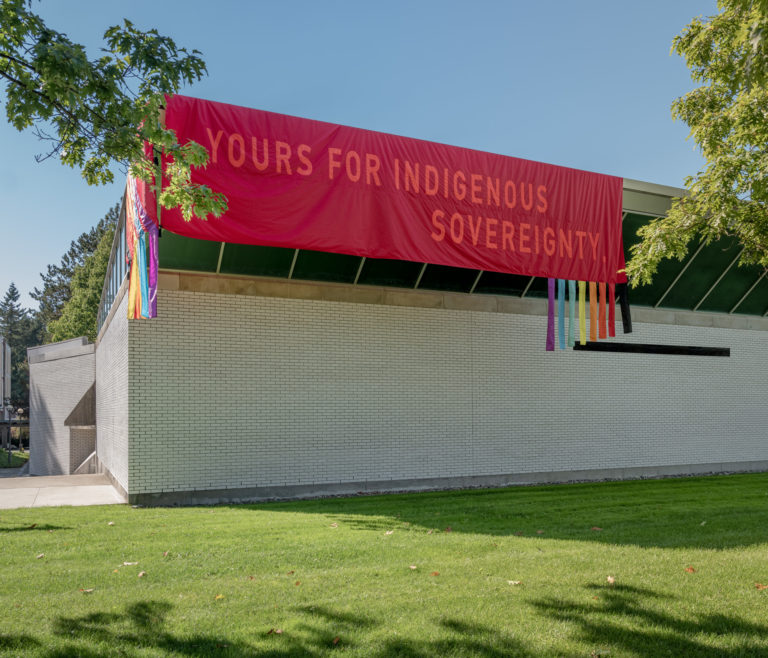
The ReMatriate Collective, YOURS FOR INDIGENOUS SOVEREIGNTY, 2018, appliqué banner. Courtesy of Jeneen Frei Njootli, Tsēmā Igharas and Denver Lynxleg.
Photo: Rachel Topham
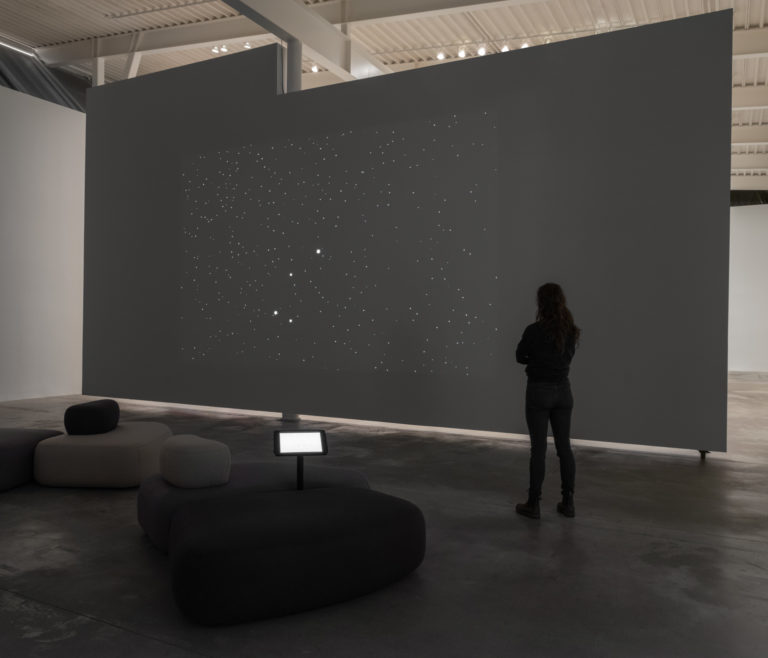
Christine D’Onofrio, Intuition Commons, www.intuitioncommons.com, 2018, interactive database. Courtesy of the artist. Produced with the support of the Canada Council for the Arts, Creative BC and BC Arts Council. Programming provided by Plot+Scatter. Sound by Scott Catolico.
Photo: Rachel Topham
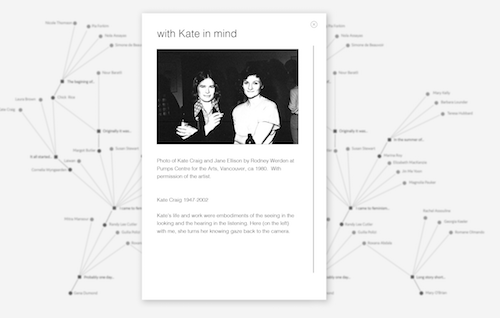
Christine D’Onofrio, Intuition Commons, www.intuitioncommons.com, 2018, interactive database. Courtesy of the artist. Produced with the support of the Canada Council for the Arts, Creative BC and BC Arts Council. Programming provided by Plot+Scatter. Sound by Scott Catolico.
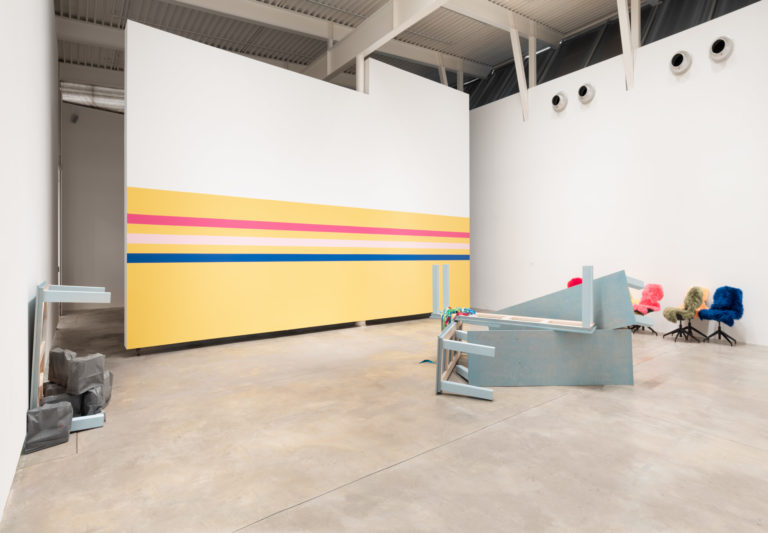
Dana Claxton and Jeneen Frei Njootli, The Sew In, 2018, ribbon, sewing machines, sheep skin, irons, ironing boards, tables, chairs, sewing materials. Courtesy of the artists.
Photo: Rachel Topham
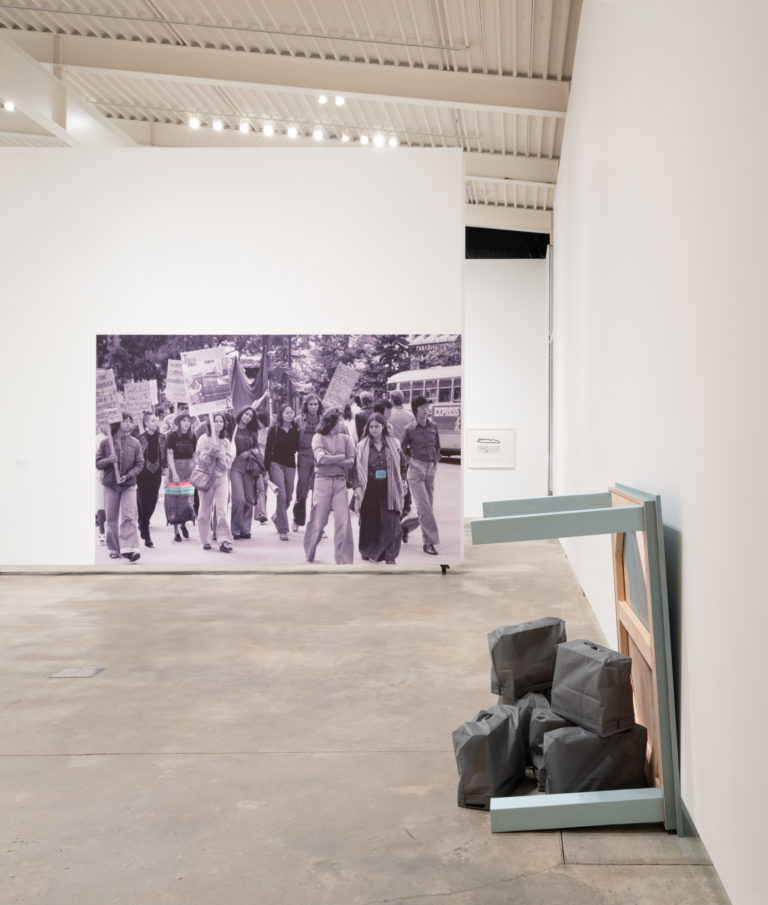
Left to right: Dana Claxton in collaboration with Sean Griffin, Muckamuck Strike Then and Now, 2018; Dana Claxton and Jeneen Frei Njootli, The Sew In, 2018. Courtesy of the artists.
Photo: Rachel Topham
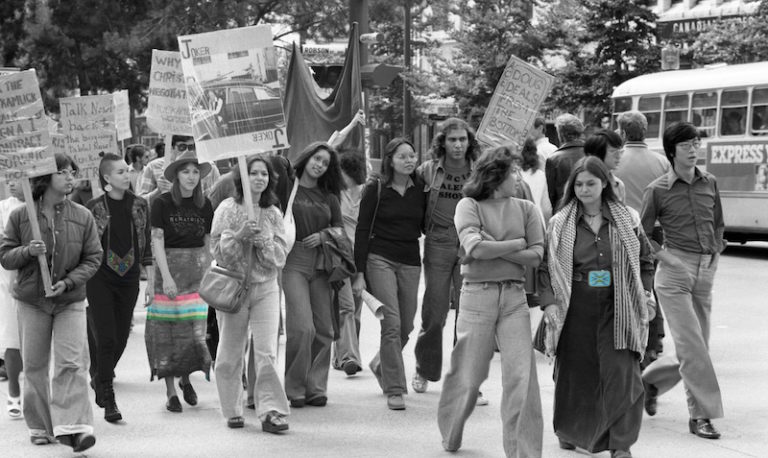
Dana Claxton in collaboration with Sean Griffin, Muckamuck Strike Then and Now, 2018. Courtesy of the artists.
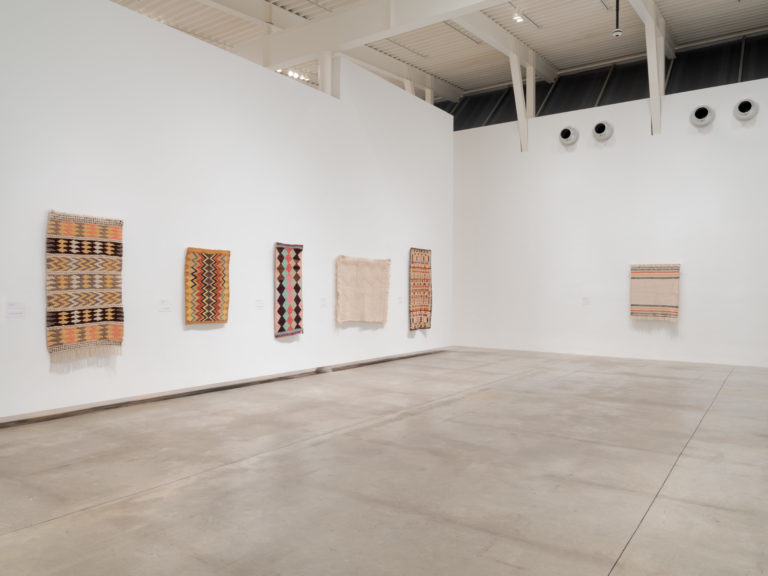
Left to right: Anabel Stewart Untitled (weaving), n.d. ; Mary Peters, Untitled (weaving), n.d.; Mary Peters, Untitled (weaving), n.d. ; Undocumented weaver (Salish Weavers Guild), Untitled (weaving), 1982.; Mary Peters, Untitled (weaving), 1968.; and Adeline Lorenzetto, Untitled (weaving), 1950–1970.
Photo: Rachel Topham
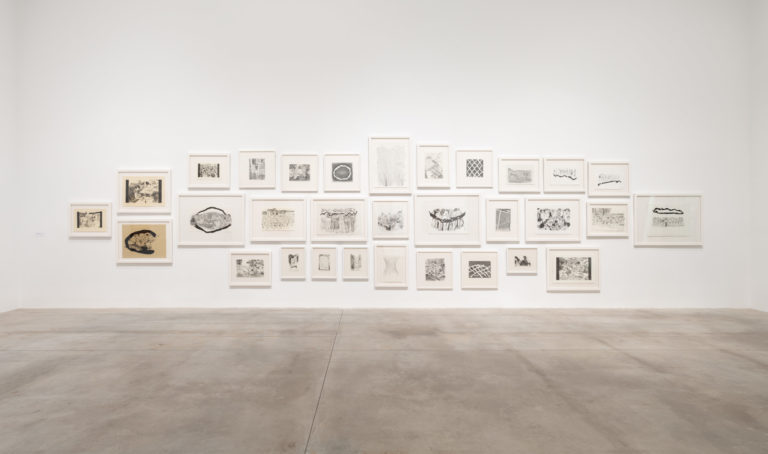
Heather Kai Smith, Encampments series, 2017– ongoing, graphite, charcoal, oil-based pencil, washi tape on paper. Courtesy of the artist.
Photo: Rachel Topham
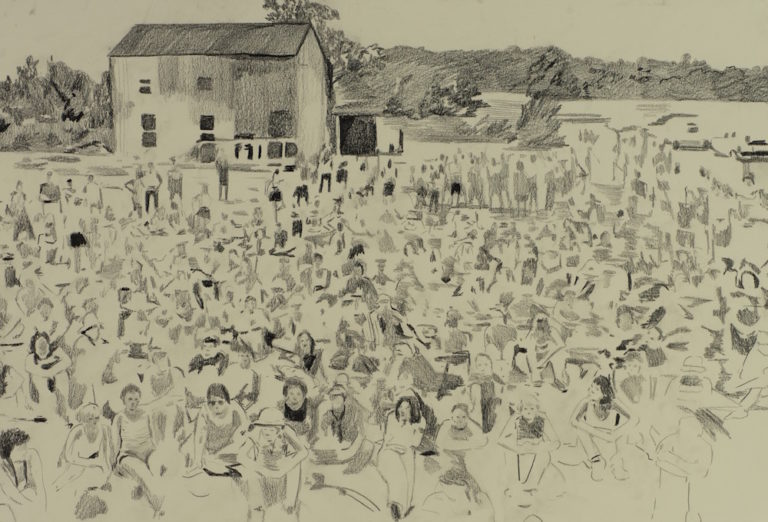
Heather Kai Smith, Field, 2018, charcoal on paper. Courtesy of the artist.
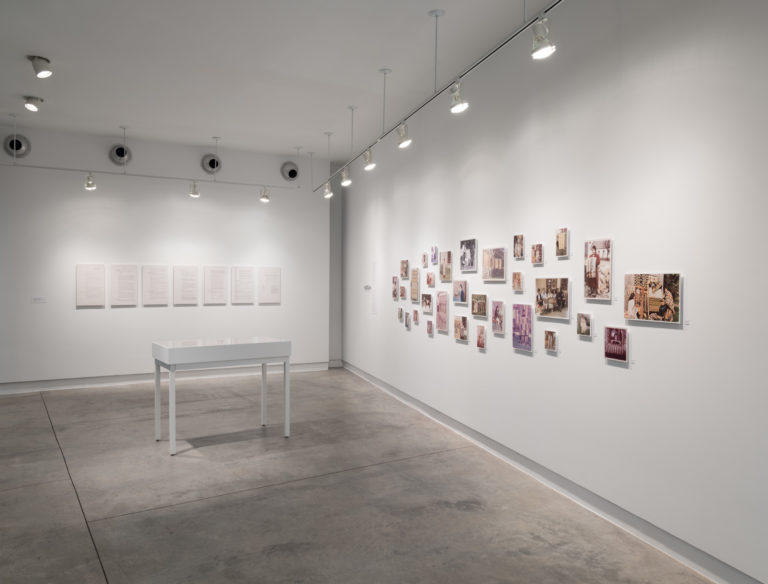
Archival materials courtesy of the Chilliwack Museum and Archives, and the Coqualeetza Cultural Education Centre.
Photo: Rachel Topham
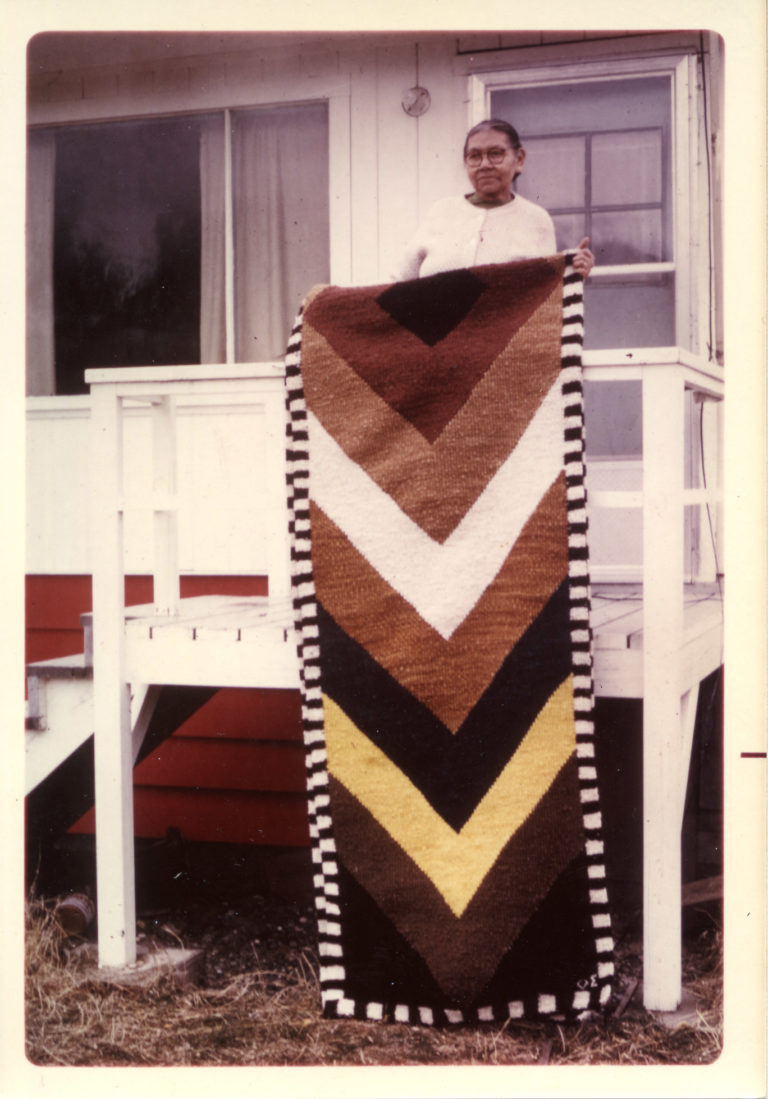
Mary Peters with Salish weaving, ca. 1967. Courtesy of the Chilliwack Museum and Archives.
-
Dana Claxton
ArtistDana Claxton (Lakota, Canadian, b.1959) is a multidisciplinary artist born in Yorkton, Saskatchewan and based in Vancouver. Drawing on Lakota cultural values, history and language, Claxton questions the multifaceted layers of identity inherent to indigenous ways of being. Issues surrounding indigenous labour and resistance, resource extraction and capital feature prominently in her latest research and work on the Service, Office and Retail Worker’s Union of Canada’s (SORWUC’s) 1978 protest action against the Muckamuck Restaurant.
Claxton’s work has been shown internationally at the Museum of Modern Art (NYC), Walker Art Centre, Sundance Film Festival, Eiteljorg Museum, and the Museum of Contemporary Art (Sydney), and held in several major Canadian public collections. Her awards include the VIVA Award and the Eiteljorg Fellowship. Her work was selected for the Sydney Biennial (2010), Biennale de Montréal (2007), Biennale d’art contemporain du Havre, France (2006), Micro Wave, Hong Kong (2005) Art Star Biennale, Ottawa (2005), and Wro 03 Media Arts Biennale Wroclaw Poland (2003).
Read More
-
Christine D'Onofrio
ArtistChristine D’Onofrio (Canadian, b. 1978) is a visual artist based in Vancouver who works in photography, video, digital media, interactive media, printmaking, sculpture, book works and installation. Her work employs a critical lens to address feminist strategies, influences and discourses pertaining to structures of exploitation, humiliation and power. Exploring the contradictions and ambiguities of liberty, especially under capitalism, her work frequently juxtaposes consumer culture and mass media with art historical references.
D’Onofrio holds a BFA from York University, Toronto and an MFA from the University of British Columbia. She has shown extensively throughout Canada in solo and group exhibitions and has received several Canada Council for the Arts Visual Arts and Research/Creation grants. She currently teaches at UBC in the Department of Art History, Visual Art and Theory and is the recipient of several teaching awards and grants including the Killam Teaching Prize in 2018 and the Teaching Learning Enhancement Fund in 2015-17 and 2018-20.
Read More
-
Jeneen Frei Njootli
ArtistJeneen Frei Njootli (Vuntut Gwitchin, b.1988) is an artist whose practice is concerned with Indigeneity-in-politics, community engagement and productive disruption. Her interdisciplinary approach uses performance, photography, sound and textiles to deconstruct the history of materials and investigate their relationship to trade, ceremonial regalia and the politics of Indigenous representation. Frei Njooti is a founding member of the ReMatriate Collective.
Frei Njootli completed her MFA at University of British Columbia in 2017. Her recent solo exhibitions have been shown by Contemporary Art Gallery, Vancouver (2018), Artspace, Peterborough, ON (2018), Southern Alberta Art Gallery, Lethbridge (2017), and Definitely Superior Art Gallery, Thunderbay ON (2017). In 2018 she was shortlisted for the Sobey Art Award. She is the recipient of the Contemporary Art Society Vancouver Artist Prize (2017) and the William and Meredith Saunderson Prize for Emerging Artists (2016).
Read More
-
Heather Kai Smith
ArtistHeather Kai Smith (Canadian, b. 1988) is an artist from Calgary, Alberta, currently living and working in Vancouver. Rooted in drawing as a practice, her work includes animation, illustration, and printmaking. Recent bodies of work engage with legacies of feminist protests, such as the Seneca Women’s Peace Encampment (1983-94). Through hand drawing and installation, Smith seeks to activate historical, archival images as a way to rearticulate revolutionary desires and activism in a contemporary context.
Smith completed her MFA at the Emily Carr University of Art and Design in 2017, and graduated with a BFA in Drawing from the Alberta College of Art and Design in 2009, Calgary, AB. Her work has been shown at Access Gallery (Vancouver), Contemporary Calgary, Jarvis Hall Fine Art, TRUCK Contemporary Art (Calgary), and DNA Artspace (London, ON). Smith is the founder of Great Women Animators, an online database aimed at educating, disseminating and championing the work of an international group of women animators from the last century.
Read More
-
Salish Weavers Guild
Artist CollectiveAdeline Lorenzetto, Shxw’ōwhámél
Mary Peters, Seabird Island
Annabel Stewart, SkwahThe Salish Weavers Guild was a group of mostly women from First Nations communities in the Fraser Valley – those known as the Stó:lō, or people of the river – who joined in relearning the ways of their ancestors, experimenting with fibre-processing, natural dyes and patterns. In 1971, the group formally incorporated as a cooperative association with the express purpose to revitalize the ancient practice of Salish wool weaving. In June 1972, their shop and headquarters opened on the grounds of the former Coqualeetza Institute, a residential school (1886–1940) and Indian Hospital (1941–1969) since reclaimed by the local First Nations (1969–present). Over sixty women, and some men, were once involved in the Guild in varying capacities.
The women of the Guild were creating more than weavings; they were generating agency in a period of expansive cultural and economic revival, while strengthening relationships across Indigenous and non-Indigenous communities. While the Guild’s collective activities and sales wound down by the mid-1980s, Salish weaving continues to flourish, connecting people throughout Salish territories.
Read More
-
The ReMatriate Collective
Artist CollectiveKelly Edzerza-Bapty (Tahltan, Canadian, b. 1982)
Jeneen Frei-Njootli (Vuntut Gwitchin, b.1988)
Tsēmā Igharas (Tahltan, Canadian, b. 1984)
Denver Lynxleg (Tootinaowaziibeeng, Canadian, b. 1986)First initiated in 2014 as an online discussion in response to the gross misrepresentation of Indigenous womxn in the media, the ReMatriate Collective formed in 2015. ReMatriate’s name is a play on the term repatriation, which describes the return of cultural belongings to their rightful communities. An important process of decolonization, the etymology of the word repatriation reflects non-Indigenous concepts and relationships to belongings, place, land and ownership. ReMatriate challenges this framework by re-centering Indigenous matriarchs, womxn, Elders, non-gender binary and Two-Spirited individuals in their practice.
ReMatriate is dedicated to honouring Indigenous women, and to the strengthening of future generations through positive self-representation. They realize these goals through the dissemination of public visual and text based works and exhibitions, including an online and social media photo campaign that uplifts and celebrates Indigenous women everywhere by offering hands-on workshops that include traditional practices and practical skill development, and through resisting and educating the public on critical Indigenous women’s issues.
Read More
-
Lorna Brown, Curator
Curator
Funders
The Beginning with the Seventies project is made possible with the generous support of the Vancouver Foundation, the Canada Council for the Arts, the British Columbia Arts Council, our Belkin Curator’s Forum members and the Department of Canadian Heritage Young Canada Works Program. We are grateful to Marie Weeden, Chilliwack Museum and Archives, Coqualeetza Cultural Education Centre and the UBC Museum of Anthropology for the loan of their Salish weavings.
Related
-
Publication
2020
Beginning with the Seventies
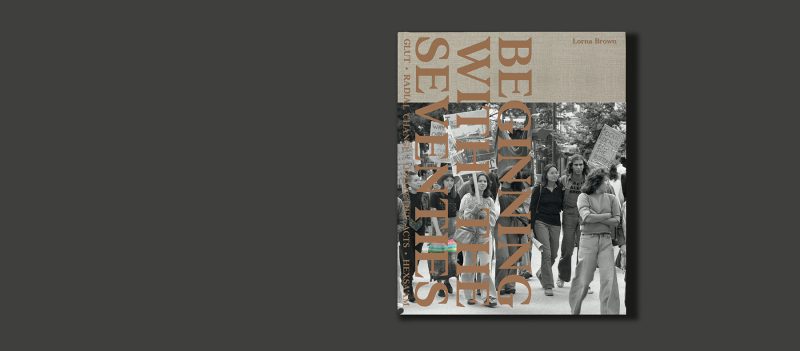 Exhibition catalogue from the four exhibitions associated with the Beginning with the Seventies project at the Belkin: GLUT (12 January-8 April 2018), Radial Change (22 June-12 August 2018), Collective Acts (4 September-2 December 2018) and Hexsa'am: To Be Here Always (11 January-7 April 2019), edited by Lorna Brown, Greg Gibson and Jana Tyner. [more information and purchase]
Exhibition catalogue from the four exhibitions associated with the Beginning with the Seventies project at the Belkin: GLUT (12 January-8 April 2018), Radial Change (22 June-12 August 2018), Collective Acts (4 September-2 December 2018) and Hexsa'am: To Be Here Always (11 January-7 April 2019), edited by Lorna Brown, Greg Gibson and Jana Tyner. [more information and purchase] -
Event
29 Sep 2018, 1-2:30 pm
Artist Talk: Christine D’Onofrio and Heather Kai Smith
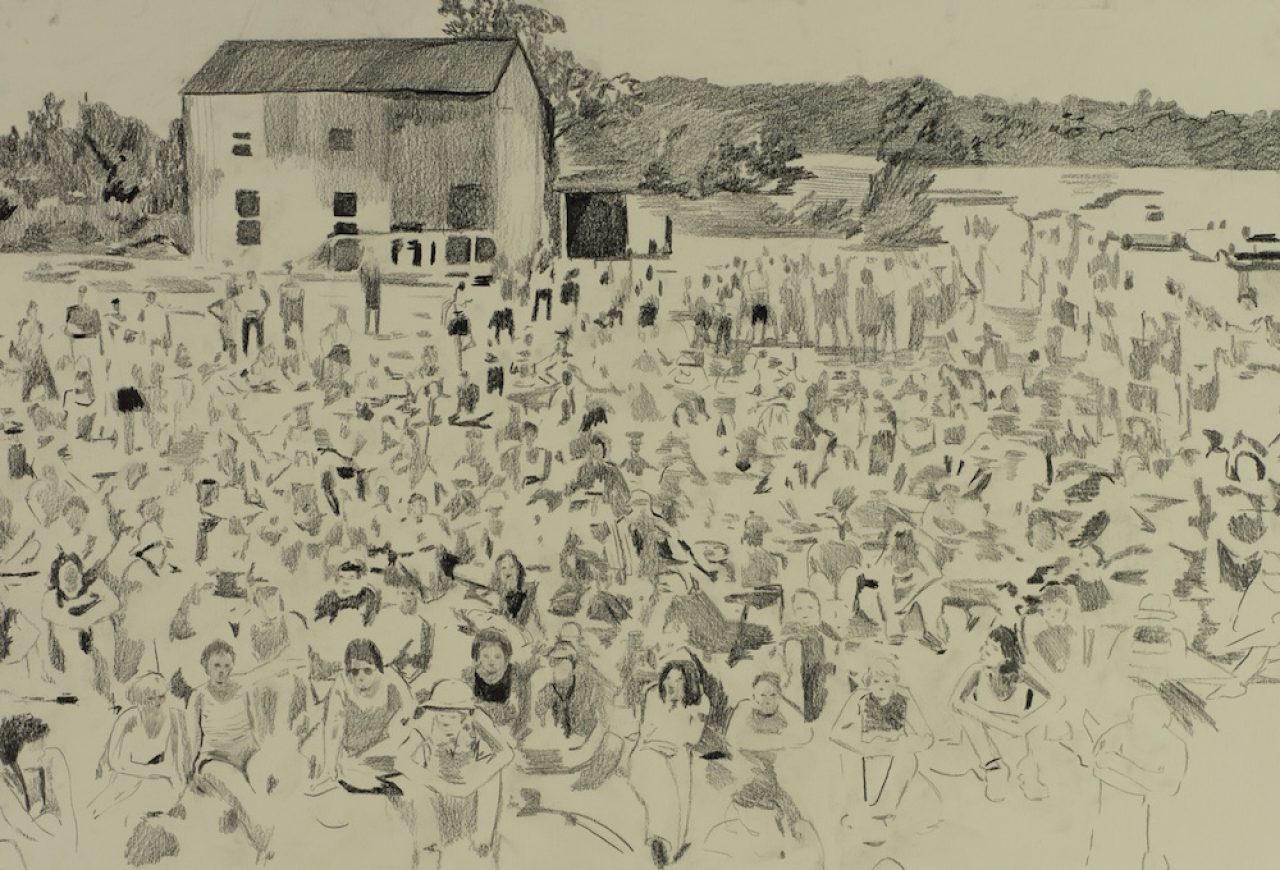
In conjunction with our fall exhibition Beginning with the Seventies: Collective Acts, join us for a talk by Christine D’Onofrio (UBC Department of Art History, Visual Art and Theory) and Heather Kai Smith (Emily Carr University of Art + Design).
[more] -
Event
19 Oct - 21 Oct 2018, 1-4:00 pm. Three-day workshop.
Workshop: Ribbon Skirt Making
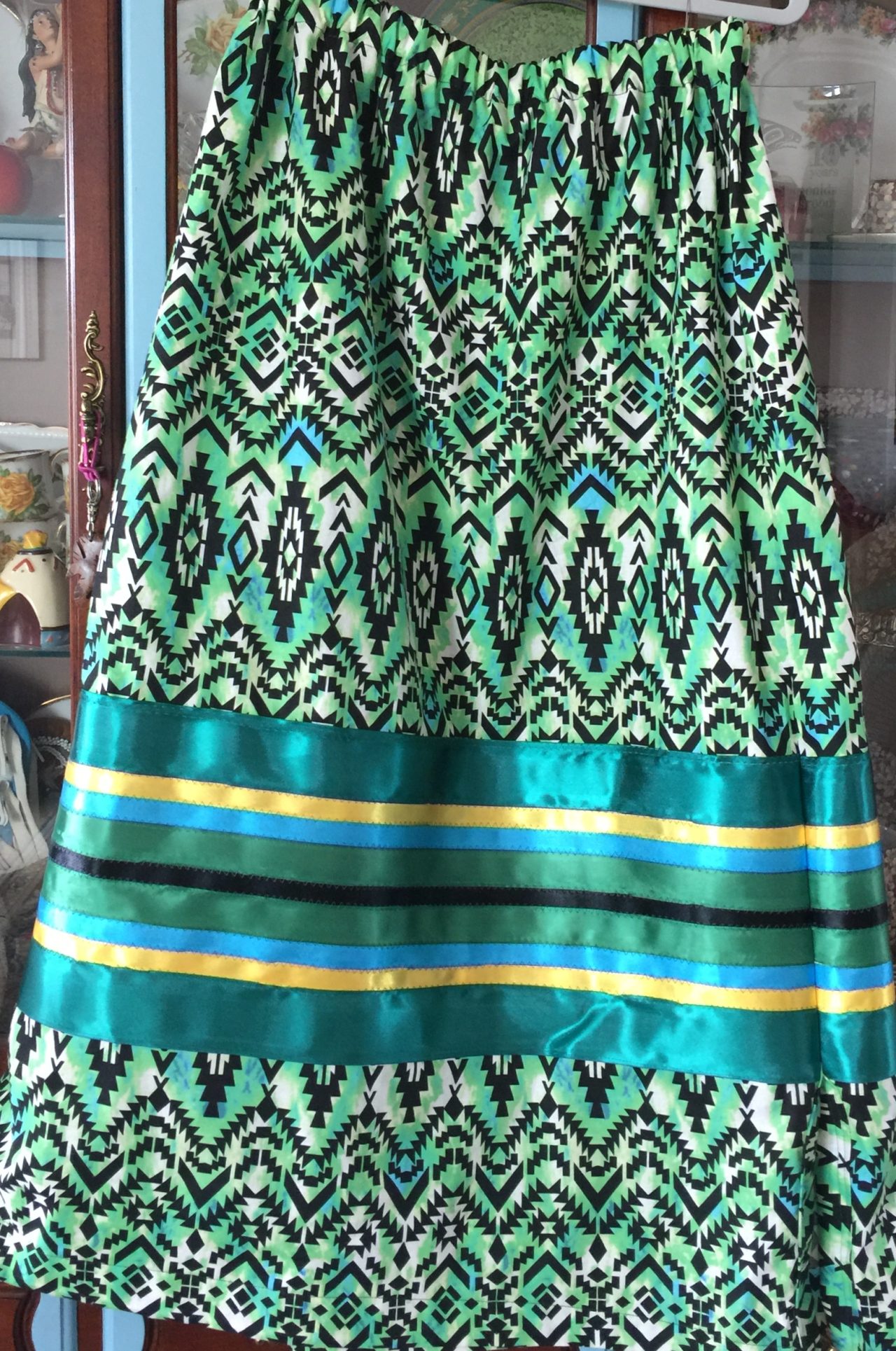
Join artist and educator Kim Soo Goodtrack and learn about the practice of making Ribbon Skirts. In conjunction with the exhibition, Beginning with the Seventies: Collective Acts, these workshops are part of a new collaborative installation by Dana Claxton and Jeneen Frei Njootli titled, The Sew In (2018). This work of art considers the sharing of Indigenous cultural knowledge, care, connection, labour and pleasure as integral components to the process of making art.
[more] -
Event
28 Oct 2018, 11 am - 2 pm. One-day workshop.
Workshop: Ribbonizing a Shirt
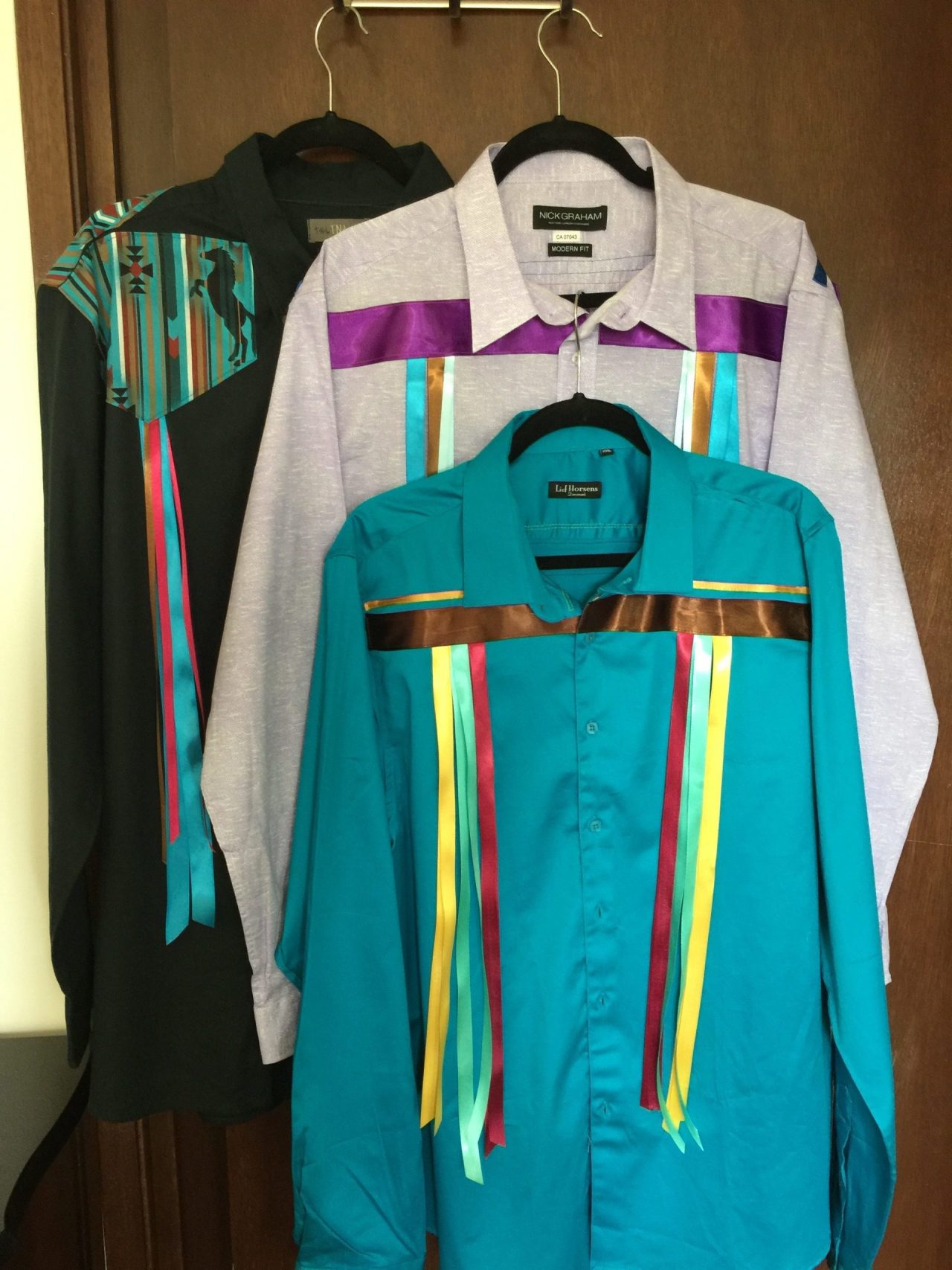
Join artist and educator Kim Soo Goodtrack and learn about the practice of making Ribbon Shirts. In conjunction with the exhibition, Beginning with the Seventies: Collective Acts, these workshops are part of a new collaborative installation by Dana Claxton and Jeneen Frei Njootli titled, The Sew In (2018). This work of art considers the sharing of Indigenous cultural knowledge, care, connection, labour and pleasure as integral components to the process of making art.
[more] -
Exhibition
12 January 2018 – 8 April 2018
Beginning with the Seventies: GLUT
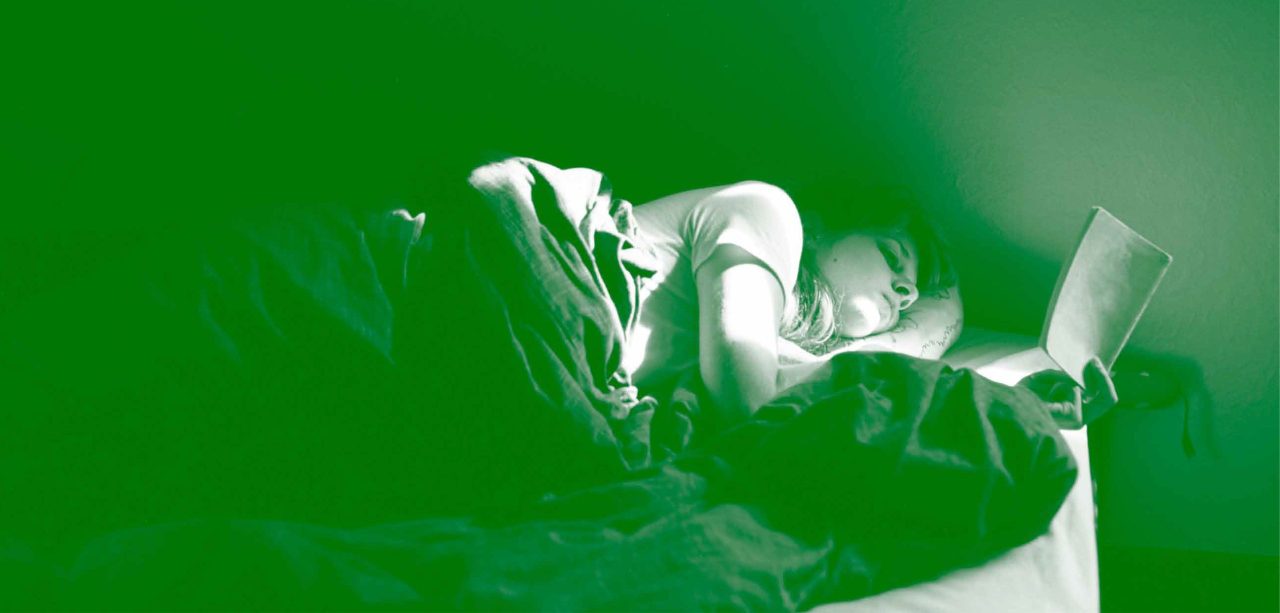
Celebrating the excessive abundance of the archive, Beginning with the Seventies: GLUT is concerned with language, depictions of the woman reader as an artistic genre and the potential of reading as performed resistance.
[more] -
Exhibition
22 June 2018 – 12 August 2018
Beginning with the Seventies: Radial Change
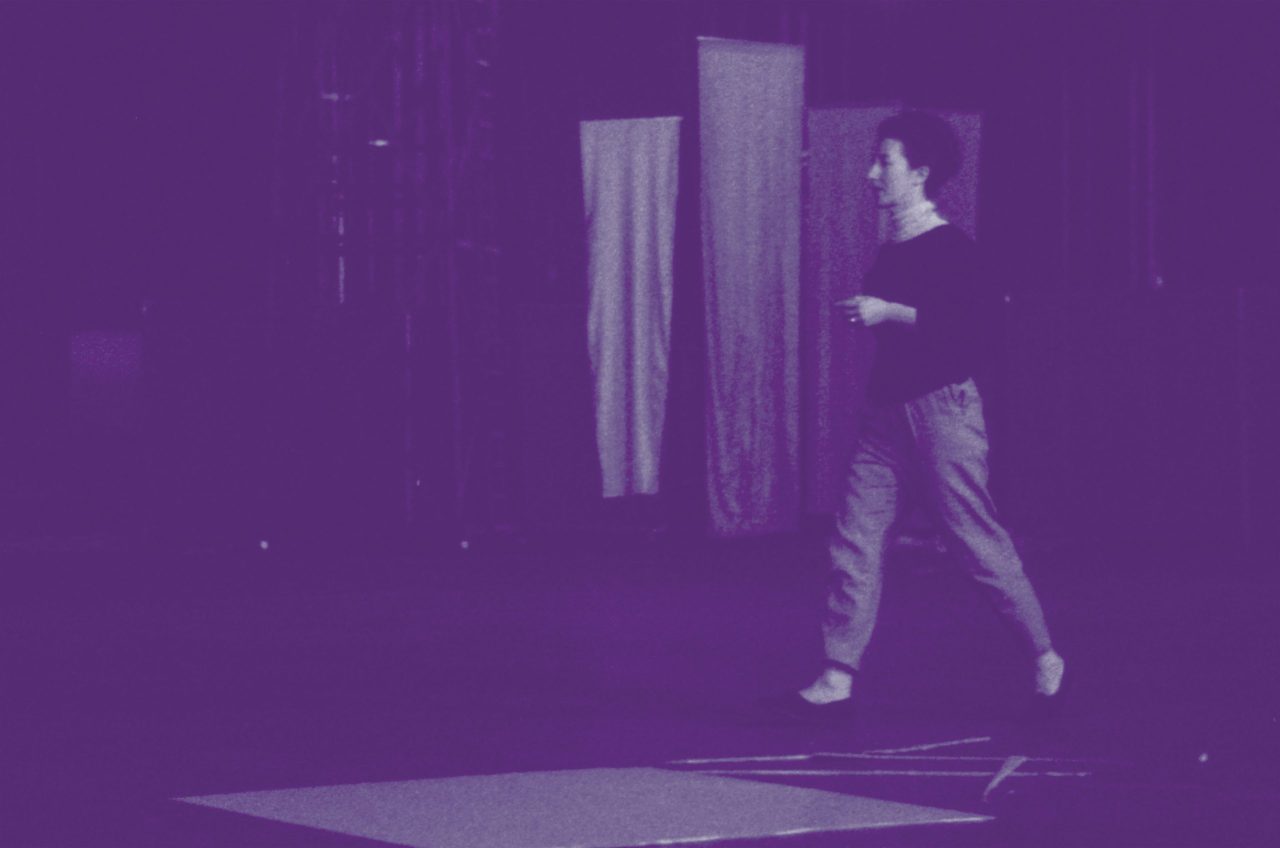
How is an archive formed? Memories of performance often exceed the containment of the document, whether photography, film, prop or testimony. As communities disperse and regroup over time, figures may slip away from the centre. Circling around the embodied archive, the exhibition Radial Change is drawn from the title of a dance work by Helen Goodwin. The elusive histories of Goodwin’s choreography and her influence on the interdisciplinary art scene of the 1970s are explored in new installation works by Evann Siebens and by Michael de Courcy.
[more] -
News
28 Aug 2018
Call for Contributions to the Intuition Commons
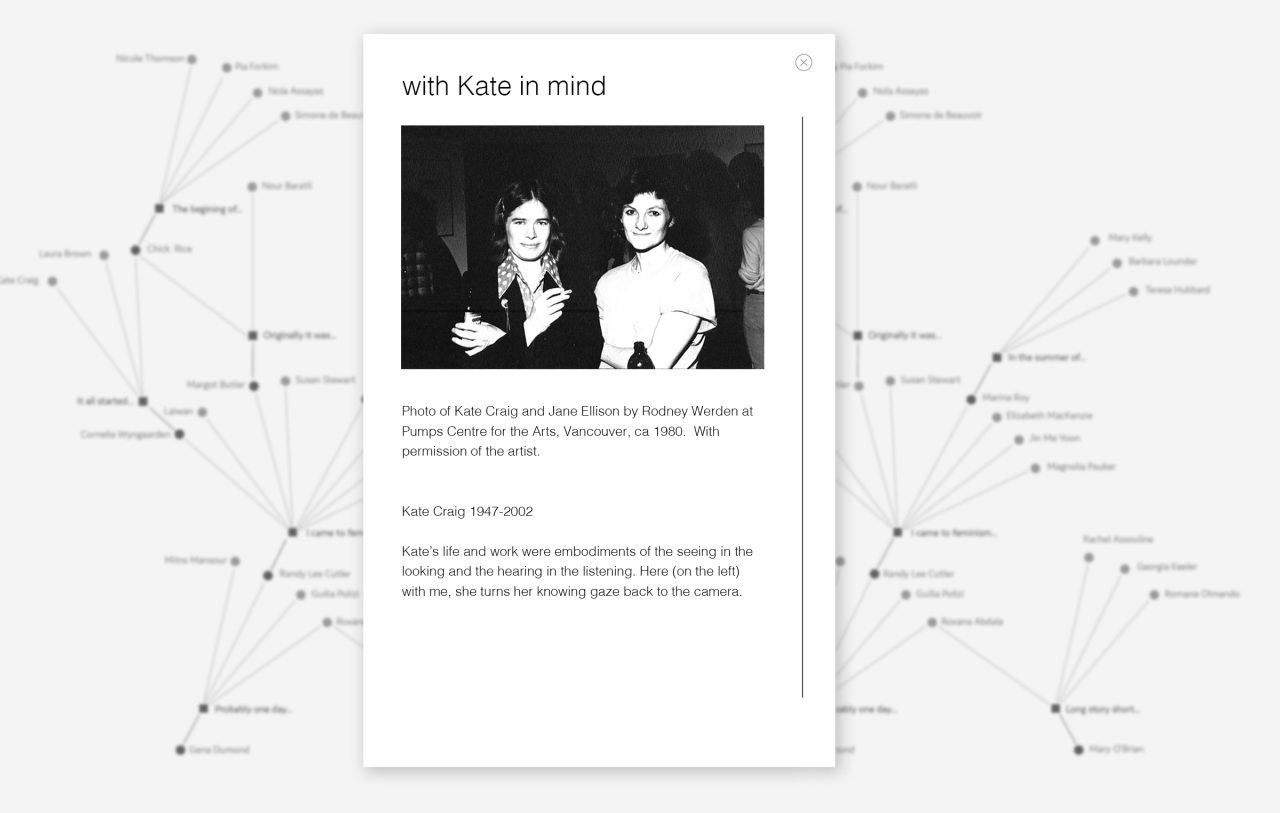
As part of Collective Acts, we invite you to visit the newly-launched Intuition Commons, a space that aims to facilitate an archive of female influences in creative practice that lie outside of conventional citations.
[more] -
Event
Session 1: 25 Sep 2018, 7:00 pm - 9:00 pm
Session 2: 9 Oct 2018, 7:00 pm - 9:00 pm
Session 3: 6 Nov 2018, 7:00 pm - 9:00 pm
Session 4: 20 Nov 2018, 7:00 pm - 9:00 pm
Session 5: 22 Jan 2019, 7:00 pm - 9:00 pm
Reading Group: Judith Butler
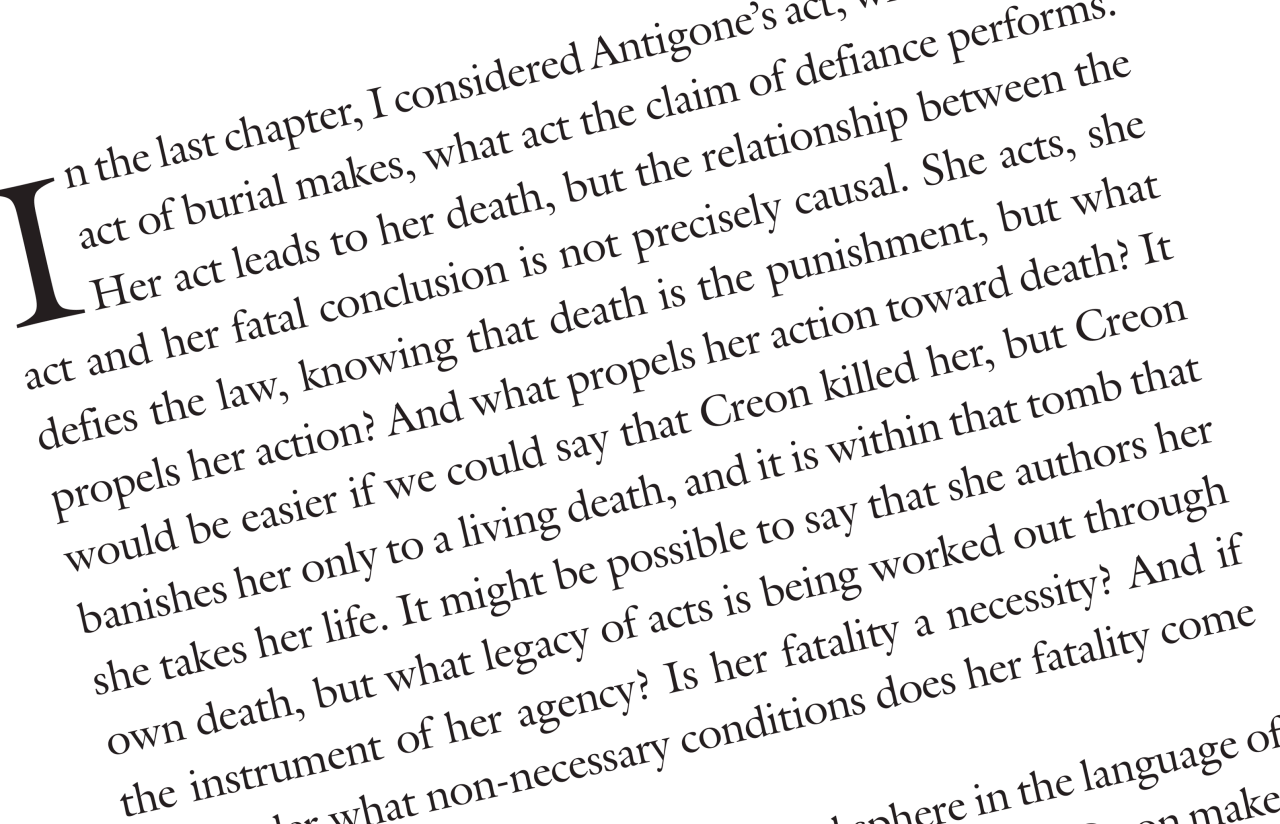
The Morris and Helen Belkin Art Gallery and the Institute for Gender, Race, Sexuality and Social Justice will host a study group on the work of Judith Butler at at Pollyanna 圖書館 Library, 221A. This six-session study group is convened in anticipation of her academic visit and public lecture at UBC in the Winter of 2019.
[more] -
Event
2 Nov 2018 from 3-6 pm
Symposium: Collective Acts
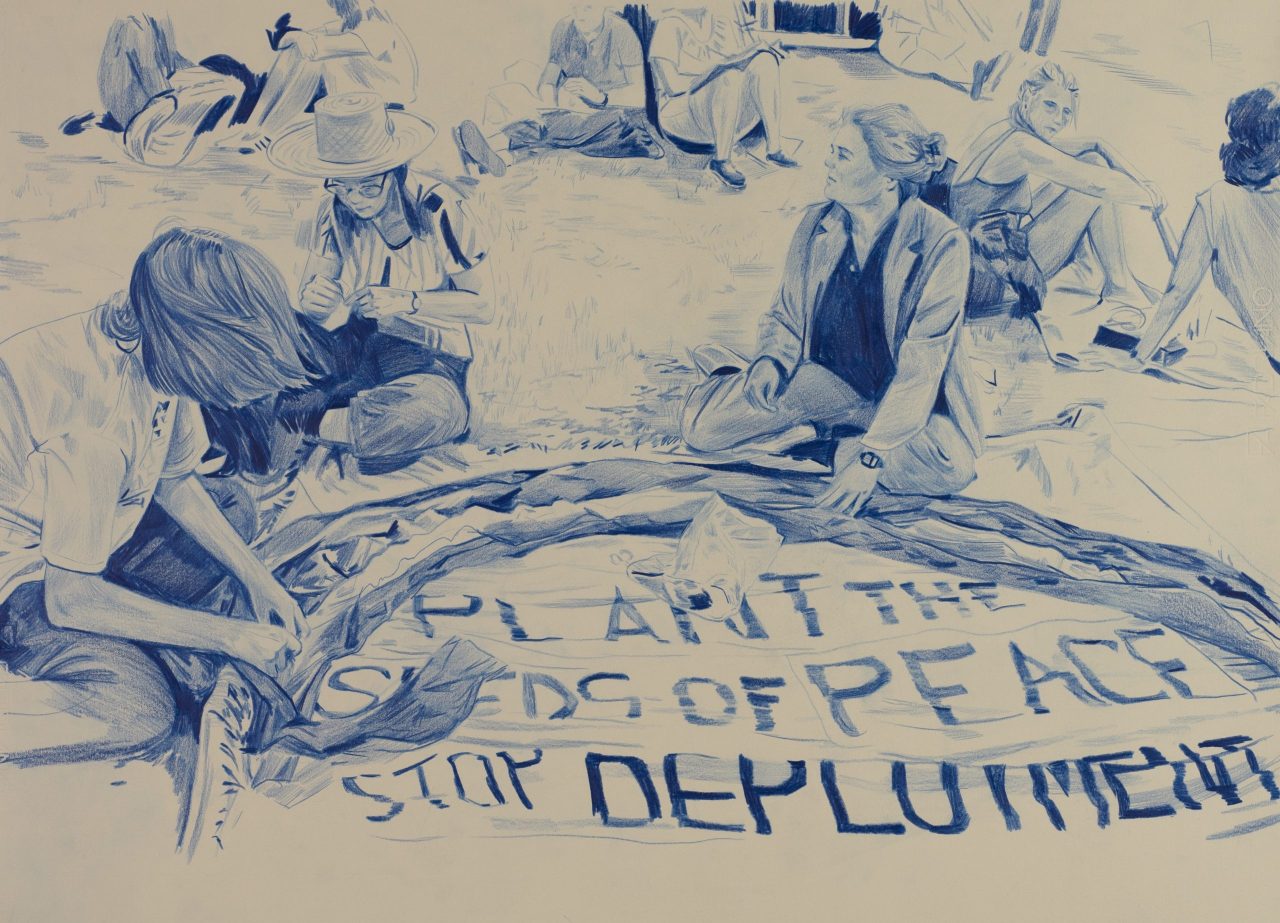
As part of the exhibition Beginning with the Seventies: Collective Acts, the Belkin is honoured to present an afternoon symposium addressing key issues in feminism related to collective organizing, mobilization and individual resistance. How does attention to the archive affect everyday experience and acts of resistance to hegemonic inequality? Attending to struggles with racism, sexism, heterosexism, and other intersecting oppressions, this program will address the exhibition and the stubborn frustrations that persist in perpetuity. Please join us in conversation with Candice Hopkins and Marilyn Dumont.
[more] -
Event
28 Nov 2018 at 2 pm
Concert at the Belkin: Collective Acts
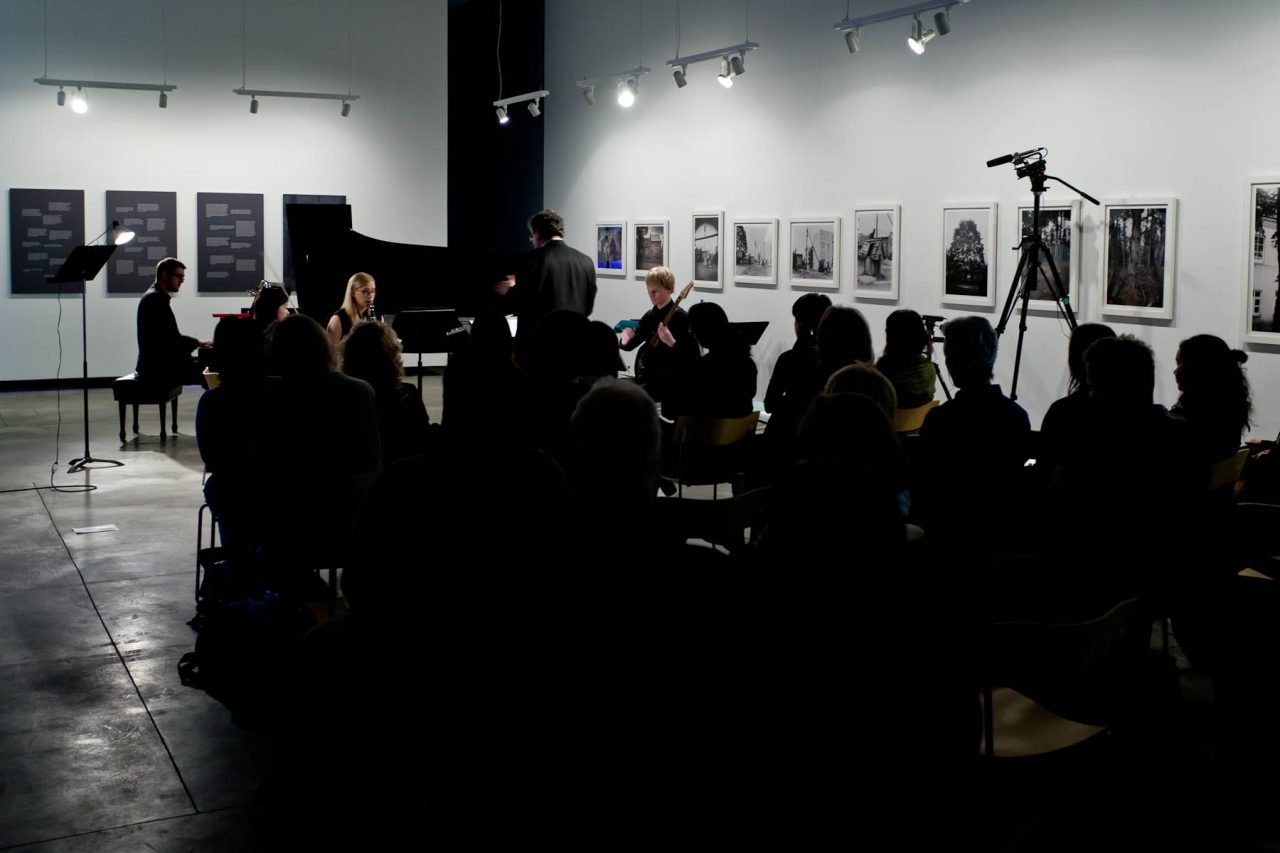
Join us for a concert by the UBC Contemporary Players at the Belkin Art Gallery. Ensemble Director Paolo Bortolussi presents a program that celebrates the Belkin Art Gallery’s current exhibition Beginning With the 70s: Collective Acts.
[more] -
Event
3 Nov 2018 from 1-2:30 pm
Independent Archives Week 2018. Artists Respond: Laiwan, Elizabeth MacKenzie and Cindy Mochizuki

How do we respond to archives both public and private? In this come-and-go event, artists Laiwan, Elizabeth MacKenzie and Cindy Mochizuki respond to artist Christine D'Onofrio's online project, Intuition Commons and the Belkin Gallery's Archive. The activities are open for viewing, listening and conversations throughout the event. Light refreshments will be served.
[more] -
Event
Fri 6 March 2020 at 5 pm
Sat 7 March 2020 at 1 pm
Book Launch and Symposium: Beginning with the Seventies
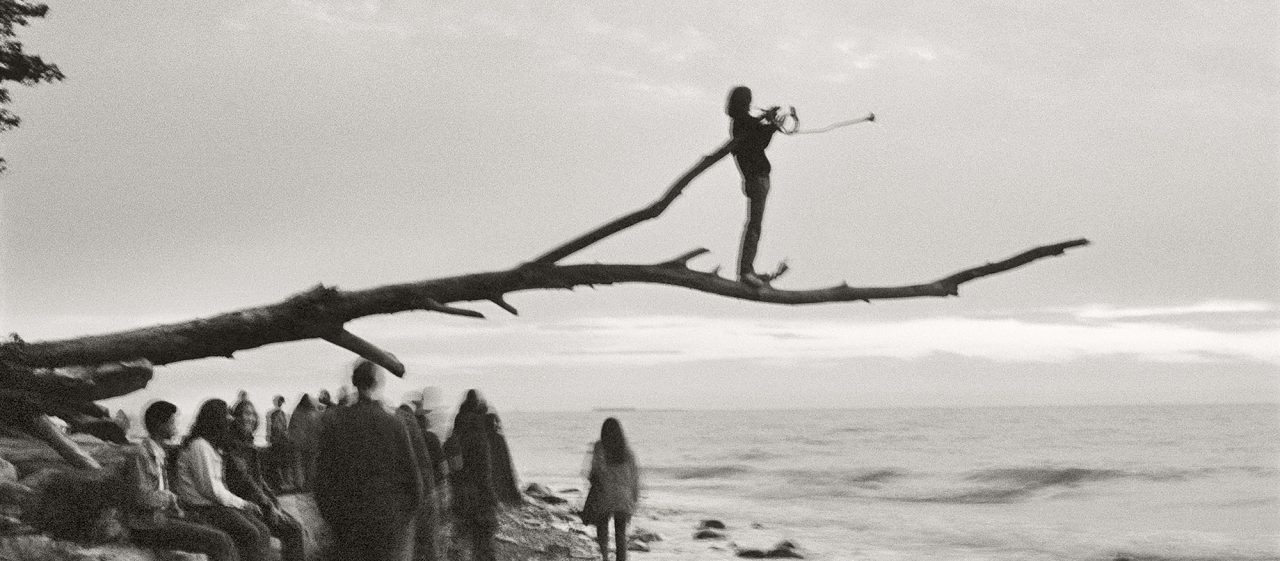
Please join us for a book launch and series of attendant events - readings, discussions, lectures - to celebrate the publication of our Beginning with the Seventies project. The program will take place on Friday, March 6 at the Musqueam Cultural Centre and Saturday, March 7 at the University Centre. Presenters include Lorna Brown, Lisa Darms, Thea Quiray Tagle, Kate Hennessy, Sarah Hunt, Yaniya Lee, Jaqueline Mabey, Allyson Mitchell and Lisa Robertson.
[more]



